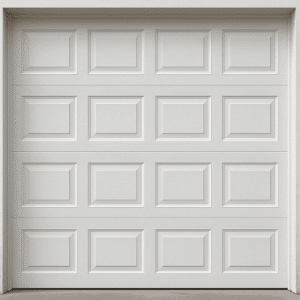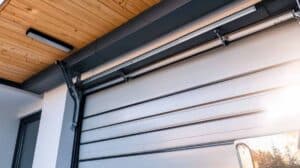Topics Covered:
Weather can be surprisingly unforgiving when it comes to your garage door panels. From scorching heat to icy storms, each climate challenge can wreak havoc on the materials and overall structure of your door.
The Impact of Different Climates
Your local weather patterns often determine the type of wear and tear your garage door panels will face. Common climatic challenges include:
- High Humidity and Rain: Causes wood to warp or rot and can lead to rust on metal doors.
- Extreme Heat: Can cause paint to fade, peel, or bubble and warp certain materials.
- Snow and Ice: Potentially warps panels, adds weight to the door, and can damage weather stripping.
- Wind and Storm Debris: Flying branches or debris can dent or crack panels, especially during high-wind events like hurricanes.
According to the National Oceanic and Atmospheric Administration (NOAA), weather events in the U.S. have become more intense, increasing the likelihood of damage to homes and exterior structures. Being prepared is key.
Moisture-Related Damage
Moisture is one of the biggest culprits for panel deterioration. Wood doors absorb water, leading to swelling, warping, and eventually rot. Metal doors can develop rust if protective coatings are compromised. Signs of moisture damage include:
- Discoloration or dark spots on wood
- Rust patches on steel or aluminum
- Mold or mildew growth near panel edges
Prevention Tips:
- Seal and Stain: For wood doors, apply a water-resistant stain or sealant every couple of years.
- Rust Inhibitors: For metal doors, touch up paint and use rust-inhibiting primers on exposed metal.
- Check Weather Stripping: Ensure it’s intact to prevent water seepage along the bottom of the door.
Repair Options:
- Minor Rot or Rust: Sand away the affected area, apply filler (for wood) or rust inhibitor (for metal), then repaint.
- Severe Damage: Replace the affected panel if structural integrity is compromised.
Heat and UV Exposure
If you live in a region with blazing summers, your garage door panels can suffer from prolonged UV exposure and high temperatures. UV rays can fade paint, and intense heat can cause materials to expand and contract, leading to cracks or warped panels over time.
Prevention Tips:
- Choose UV-Resistant Paint: Many modern coatings are formulated to reflect or absorb less heat.
- Insulation Upgrades: Insulated panels can help regulate internal temperatures, reducing the thermal stress on the door.
- Shade and Ventilation: If possible, adding a canopy or ensuring proper ventilation in your garage can reduce heat buildup.
Repair Options:
- Repainting: Faded or peeling paint can be stripped and repainted with a UV-protective coating.
- Panel Replacement: Severely warped panels may require replacement, especially if they affect the door’s operation.
Snow, Ice, and Freezing Temperatures
In colder climates, ice can build up along the base of your garage door, making it difficult to open or close. Rapid freeze-thaw cycles can also lead to panel cracking or warping, especially if water seeps into small gaps and then freezes.
Prevention Tips:
- Clear Snow and Ice Promptly: Keep the area around the door free of snow to prevent ice dams.
- Weather Stripping: Good seals can block moisture from seeping into panel edges.
- Lubrication: Cold weather can stiffen door components, so use a cold-resistant lubricant on hinges and rollers.
Repair Options:
- Minor Cracks: Fill and seal them before they widen with repeated freeze-thaw cycles.
- Major Warping: Might require realigning or replacing the panel, depending on severity.
Wind and Storm Damage
High winds, hurricanes, and even tornados can turn everyday items into destructive projectiles. Garage doors often bear the brunt of these forces, and a compromised panel can lead to the door failing entirely. In hurricane-prone regions, local building codes sometimes require wind-rated garage doors.
Prevention Tips:
- Reinforced Panels: Some doors come with internal reinforcement bars to withstand high winds.
- Storm Shutters: If your region frequently experiences intense storms, consider adding shutters or braces over your garage door.
- Annual Inspections: Check for loose hardware or panel weaknesses before hurricane season.
Repair Options:
- Replacing Dented Panels: Dents from debris can weaken structural integrity if not addressed.
- Realigning Tracks and Hardware: After a storm, ensure the door’s mechanical systems haven’t been knocked out of alignment.
Choosing Weather-Resistant Materials
One of the most proactive measures you can take is selecting panel materials that naturally resist your local weather challenges:
- Coastal Climates: Aluminum or vinyl panels with rust-resistant hardware can be a lifesaver.
- Hot, Dry Environments: Steel with UV-protective coatings or fiberglass panels can handle the heat.
- Cold, Snowy Regions: Insulated steel panels excel in temperature regulation and durability.
At RJ Garage Door Services, we always ask about local climate conditions before recommending repair or replacement materials. Our goal is to ensure longevity, not just aesthetics.
Routine Maintenance Year-Round
Regardless of climate, consistent upkeep can drastically reduce weather-related damage. A few universal tips include:
- Regular Cleaning: Remove dirt and debris that can trap moisture or block vents.
- Inspect Seals: Replace worn weather stripping to keep out water, snow, and hot or cold air.
- Paint and Seal: Renew protective coatings as needed, especially if you notice chipping or fading.
- Professional Check-Ups: An annual or bi-annual inspection can catch developing issues before they escalate.
When to Seek Professional Help
If you see signs of significant panel warping, deep rust, or if the door struggles to open and close smoothly, it’s time to call in the pros. Some weather-related damage is purely cosmetic, but often there’s more going on beneath the surface. We’ll assess whether a simple repair will suffice or if a panel replacement is necessary.
Signs You Need Professional Intervention:
- Multiple cracks or dents from storm debris
- Panels that don’t align properly after severe weather
- Excessive water damage or mold growth
- Door won’t open or close due to ice buildup in the tracks
Our team at RJ Garage Door Services is trained to handle everything from minor fixes to major overhauls, ensuring your garage door remains weather-resistant and functional.
Long-Term Savings and Peace of Mind
Investing in weather-related repairs or upgrades might feel like a significant expense at first, but it can pay off by preventing more extensive damage (and costs) down the line. A door that’s designed and maintained to withstand local weather not only protects your garage’s contents but also preserves the structural integrity of your home.
Plus, many insurance companies offer discounts for homes equipped with hurricane-rated doors or other weather-resistant features. Check with your provider to see if you qualify for a reduced premium.
Final Thoughts
The elements can be tough on garage door panels, but knowledge is your best defense. By understanding how humidity, heat, cold, and wind can affect different materials—and taking steps to protect your door—you can significantly reduce the risk of weather-related damage.
Should you find yourself dealing with panels warped by intense heat or dinged by storm debris, remember that help is just a phone call away. At RJ Garage Door Services, we have the expertise, tools, and materials to restore your door to peak condition, no matter what Mother Nature throws your way.




